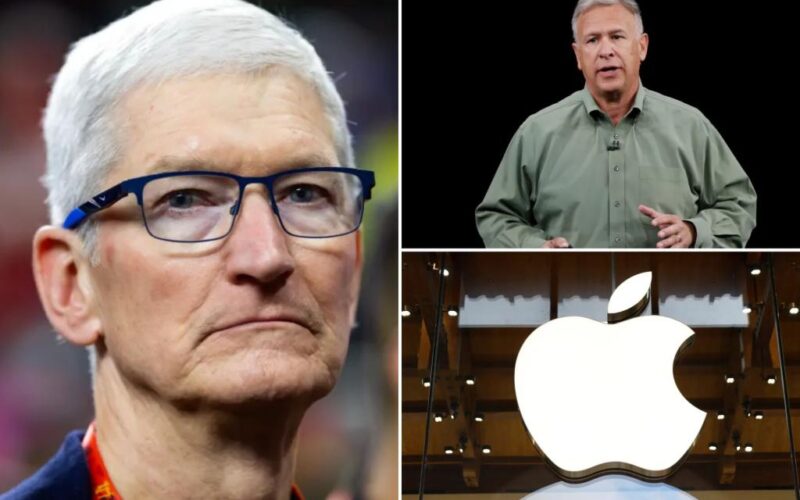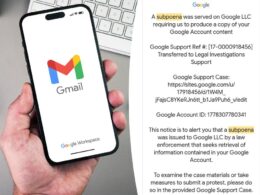Apple faces possible criminal charges after a federal judge ruled the tech giant violated an antitrust order related to App Store restrictions — and singled out CEO Tim Cook for allegedly rejecting his deputies’ advice to comply with the ruling.
In an explosive decision Wednesday, US District Judge Yvonne Gonzalez Rogers wrote that Cook “chose poorly” when he directed his charges to allegedly defy a court order in connection with Apple’s long-running dispute with Epic Games.
The “Fortnite” maker accused Apple of anticompetitive behavior as it imposed stiff developer fees, resulting in a 2021 injunction that required Apple to allow developers to offer users alternative ways to pay for services and subscriptions outside the App Store.
According to Rogers, internal discussions at Apple revealed that senior executives including Phillip Schiller, Apple’s senior vice president of worldwide marketing, pushed for the company to comply with the court’s order, but that Cook ultimately sided with his finance team in pursuing a different path.
“Internally, Phillip Schiller had advocated that Apple comply with the Injunction, but Tim Cook ignored Schiller and instead allowed Chief Financial Officer Luca Maestri and his finance team to convince him otherwise,” the judge wrote in a sharply worded opinion.
“Cook chose poorly.”
Rogers also accused another top Apple executive, Alex Roman, of having “outright lied” during the iPhone maker’s high-profile legal battle with Epic Games over its controversial App Store fees.
“To hide the truth…Roman…outright lied under oath,” Rogers wrote, stating that Apple “adopted the lies and misrepresentations to this Court.”
In the extraordinary ruling, Rogers, who was appointed to the federal bench by Barack Obama, made it clear that this was not a case of misunderstanding or negligence.
The evidence “more than meets the clear and convincing standard to find a violation,” Rogers ruled as she referring the matter to the US Attorney’s office to consider criminal contempt charges against Apple and relevant individuals.
“This is an injunction, not a negotiation. There are no do-overs once a party willfully disregards a court order,” Rogers wrote.
In response, Apple issued a statement saying, “We strongly disagree with the decision. We will comply with the court’s order and we will appeal.”
Roman did not respond to requests for comment.
The 2021 injunction at the center of the Apple-Epic Games legal battle barred the tech behemoth from preventing developers from including in their apps “buttons, external links, or other calls to action” that direct users to alternative purchasing methods outside of Apple’s in-app payment system.
The company was also barred from stopping developers from communicating with customers “through points of contact obtained voluntarily from customers through account registration within the app.”
Roman, who holds the title of Apple’s vice president of finance, was accused by the judge of misleading the court in connection with the company’s controversial 27% commission on purchases made outside the App Store.
According to court documents, Roman falsely testified that Apple did not evaluate the costs developers would face when using alternative payment methods for linked-out purchases.
However, the judge found that Apple had in fact considered those external costs and intentionally set its commission high enough to exceed them, undermining the credibility of Roman’s claim.
Roman also told the court that Apple had not decided what fee to impose on these purchases until Jan. 16, 2024.
The judge rejected this statement as another falsehood, citing internal business records that showed Apple had already determined the key elements of its plan — including the 27% commission — back in July 2023.
The Apple-Epic dispute centers on Epic Games challenging Apple’s control over its App Store and in-app payment system, accusing the tech giant of anticompetitive behavior after Apple removed the popular game “Fortnite” for bypassing its 30% commission.
Although Apple largely prevailed in the broader antitrust case, Epic secured a significant concession on this specific point aimed at curbing Apple’s dominance over digital commerce on iOS.
Effective immediately, Rogers ordered Apple to cease collecting commissions on purchases made via external links within apps.
She also directed the company to cover Epic Games’ legal fees related to the contempt issue.
Epic Games CEO Tim Sweeney hailed the ruling as a landmark moment for app developers.
“It’s a huge victory for developers,” he said on a conference call. “This forces Apple to compete. This is what we wanted all along.”
Additional Reporting by Thomas Barrabi








